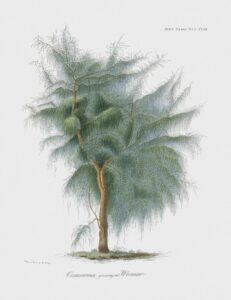By Tanvi Singh

A casuarina takes roots and bears fruits swiftly, providing strength and shade, carrying in its powerful trunk a permanence and invincibility that something as fragile and ephemeral as life lacks; the very permanence and resilience a grieving soul calls to, preserving life as it was before being marred with losses.
‘But not because of its magnificence
Dear is the Casuarina to my soul:
Beneath it we have played; though years may roll,
O sweet companions, loved with love intense,
For your sakes, shall the tree be ever dear.
Blent with your images, it shall arise
In memory, till the hot tears blind mine eyes!’
I see your words, poet—of a sibling’s lament as you called to the memories of your brother and sister, your green and beautiful childhood at Baugmaree than the grey desolate newness you had gotten used to back at Cambridge, a daughter’s grief who sees her parents wither in mourning, an adrift soul’s return to the house that now alienates her, just as anyone uprooted from their homes who return to find just empty walls devoid of one’s loving memories, yet they still try to find traces of familiarity despite the very place delivering them the greatest sorrows.
‘It is the tree’s lament, an eerie speech,
That haply to the unknown land may leach.’
I find traces of your beauteous and lush garden back in Baugmaree you wrote of in my dull grey cityscapes; neither for its beauty, nor for the stability you depend on to hold onto your siblings’ memories, of its strong branches to still remember their play, of Baugmaree’s soil to be forever etched with their imprints, but from the eyes of one mourning child to another; preserving memories of my father in my own space, getting rid of the retrenchments I put on my own emotions.
It is liberating, to feel the grief I feel echo in your words so freely. I belong—in your grounded verses you were not so inclined to share; in its raw beauty, sorrow, a love and longing for home, and the naïve hopefulness that peaks through the desolation.
‘Thy form, O tree, as in my happy prime
I saw thee, in my own loved native’s clime.’
I remember reading your poem once in passing in my college’s damp lifeless library; seeing its visceral beauty, appreciating its Wordsworthian language so reminiscent of old world poets, saturated with the voices of other poets of the Romantic Age, while still holding a certain novelty lent to you by your experiences, but not quite feel the intensity of the weight of the emotions it carried, or the tone that shifted and altered, as if you were just made aware of your grief.
Years later on my travels, a little homesick, if I were being truthful, I found the yellowing brittle pages of your book one again while perusing the shelves of the packed Archives of India House, surrounded by the rare works of luminaries of Indian literature —one fraying copy of Ancient Ballads and Legends of Hindustan dotted with stamps and ink stains—returning to it, wiser, and familiar now with the grief you talked of. I understand what you meant by a ‘happy prime’ now, not for something related to age, but experience, for life gives ephemeral moments of joy one fails to cherish till it comes back to haunt them in their moments of mourning.
Poems more often than not are tellers of the time they were composed in. You were a part of a world that was evolving fast. A child seeking belonging as you oscillated between countries—a privilege reserved for a few—you understood your unique position and perspective. Naïveté would be to dismiss your voice as just another writer settled abroad who glorified this new country you were in. You wielded your voice despite yearning both worlds; speaking of the beauty of your home, the resilience of your people being governed by an outside force, questioning stifling societal norms thrust upon women, and embracing modernity and change. Not much changed in the century now, did it? Your voice still holds true; a remainder of women’s and the land’s strife still being ever the same despite time gone by.
A residual sorrow persists and grows when I think of you; of the lives you could have touched and changed had life given you but a moment more. Your very first stanza resonates with me in its grief and joy, and telling of time’s treachery.
‘Like a huge Python, winding round and round
The rugged trunk, indented deep with scars,
Up to its very summit near the stars,
A creeper climbs, in whose embraces bound
No other tree could live.’
Perhaps this is it. The beauty of a classic lies in its endurance. Your casuarina endures, weathering everything and yet stands tall. It cares not for the creeper that acts as time’s coil winding around its trunk that stands as an everlasting beacon of your golden childhood; bruising it, yet not breaking as the ‘deathless tree’ continues to flourish and boast of its permanence with its foliage in defiance.
Grief endures. Love endures. As do your words, dear poet, taking roots in one’s heart and staying put.
Tanvi Singh is a women-centric cross-genre fiction author based in Gurgaon, India, who draws inspiration from Indian folklores and history to illuminate cultural ethos while addressing societal malpractices. Her debut novel has recently been acquired for publication.

Subscribe to our newsletter To Recieve Updates
Join our newsletter to receive updates